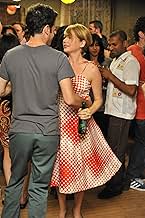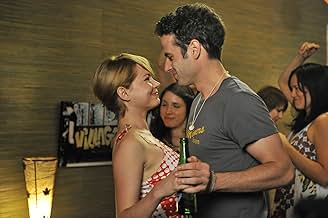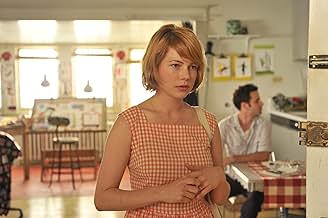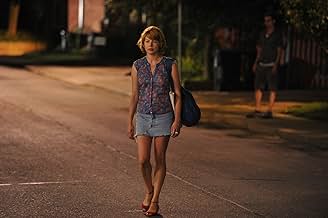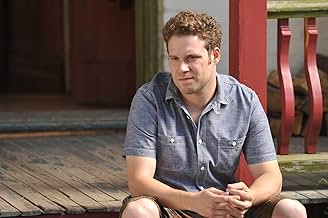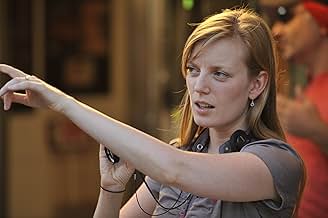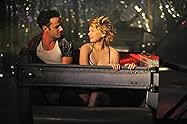Une femme mariée tombe amoureuse de l'artiste qui vit de l'autre côté de la rue.Une femme mariée tombe amoureuse de l'artiste qui vit de l'autre côté de la rue.Une femme mariée tombe amoureuse de l'artiste qui vit de l'autre côté de la rue.
- Réalisation
- Scénario
- Casting principal
- Récompenses
- 3 victoires et 19 nominations au total
Vanessa Carter
- Tony
- (as Vanessa Coelho)
Ciarán MacGillivray
- Soldier
- (as Ciaran MacGillivray)
Avis à la une
OK it's not as bad as all that -- it is sort-of OK -- but I had to say it. I'm probably not the first.
This is basically a short film on infidelity, dragged out to a couple of hours. It's not terrible, but it's also not good.
The film has its good points, of course. I found the cinematography to be great, for example. Particularly the shots in and around water were very effective, and showcase the use of film to communicate without words. But the fact that I'm noticing the cinematography first tells you that the story isn't really there.
I thought the acting was believable. Everyone performed well in their roles, as far as I can tell. Seth, Luke, and Michelle were good choices for the triangle. That said, I am confused about casting not just one but two popular comedians against type. It made me question what I was supposed to be seeing. I'm not sure I figured it out.
For me I attribute the problems to editing and writing.
The story didn't provide anyone for me to root for, identify with, or even hate. I didn't really care for any of the characters. I like these actors, but I found these characters annoying to varying degrees, but not so annoying as to be detestable. I just didn't wish to spend any more time with any of them than I had to. Perhaps if I could recognize in them any motivation for their actions (or lack thereof) it might be different. I compare this with The Postman Always Rings Twice, where understandable things happen, and lead to a more satisfying (but too preachy-perfect) ending.
The long silences here are not deep and meaningful. They're just long. I figure the film could be cut by half an hour, and not lose much beyond silence or small talk. In fact, even the end could be lopped off. There were several points where I thought it was over, but it kept going. What's odd is that there are some scenes where random half-second cuts are made, music-video-style, but real cuts to speed it along aren't made. I'm certain you could cut another hour or so and turn it into a really great short. There's nothing wrong with that, if telling the story with emotion is the goal.
The tie-in to Leonard Cohen's song seemed forced. I cringed. When I think about that scene, it feels to me like someone decided we needed a cryptic song by a Canadian poet to name the film after. I don't feel that any of the characters in the film are devoted Leonard Cohen fans.
Overall, I wouldn't recommend this film, but neither would I say to avoid it. It will surely be on the The Movie Network (among others) in Canada, since they apparently helped pay for it. The best place to see it is therefore probably cable or satellite.
This is basically a short film on infidelity, dragged out to a couple of hours. It's not terrible, but it's also not good.
The film has its good points, of course. I found the cinematography to be great, for example. Particularly the shots in and around water were very effective, and showcase the use of film to communicate without words. But the fact that I'm noticing the cinematography first tells you that the story isn't really there.
I thought the acting was believable. Everyone performed well in their roles, as far as I can tell. Seth, Luke, and Michelle were good choices for the triangle. That said, I am confused about casting not just one but two popular comedians against type. It made me question what I was supposed to be seeing. I'm not sure I figured it out.
For me I attribute the problems to editing and writing.
The story didn't provide anyone for me to root for, identify with, or even hate. I didn't really care for any of the characters. I like these actors, but I found these characters annoying to varying degrees, but not so annoying as to be detestable. I just didn't wish to spend any more time with any of them than I had to. Perhaps if I could recognize in them any motivation for their actions (or lack thereof) it might be different. I compare this with The Postman Always Rings Twice, where understandable things happen, and lead to a more satisfying (but too preachy-perfect) ending.
The long silences here are not deep and meaningful. They're just long. I figure the film could be cut by half an hour, and not lose much beyond silence or small talk. In fact, even the end could be lopped off. There were several points where I thought it was over, but it kept going. What's odd is that there are some scenes where random half-second cuts are made, music-video-style, but real cuts to speed it along aren't made. I'm certain you could cut another hour or so and turn it into a really great short. There's nothing wrong with that, if telling the story with emotion is the goal.
The tie-in to Leonard Cohen's song seemed forced. I cringed. When I think about that scene, it feels to me like someone decided we needed a cryptic song by a Canadian poet to name the film after. I don't feel that any of the characters in the film are devoted Leonard Cohen fans.
Overall, I wouldn't recommend this film, but neither would I say to avoid it. It will surely be on the The Movie Network (among others) in Canada, since they apparently helped pay for it. The best place to see it is therefore probably cable or satellite.
'I'm afraid of being in-between of things.' That's a beautiful line quoted by Margo from a film called 'Take this waltz'. Attracted by the title which reminded me of Leonard Cohen's song which turned out to be the same source at the first place, also the cast especially Michelle Williams that I find quite special, special in a way that her appearance seems to be fragrant because of how she looks like. I somehow believed that the character resembles a lot with her in real life. We all know her divorced co-star husband Heath Ledger died of an overdose accident, and they have a daughter named Mathilda. After his death she somehow emerges into a characterized actress. You can see her playing depressed wife, Marilyn Monroe, and this confused in-house freelance writer not knowing what to write about. It's all very well chosen with her characters. When I see the way she read out the lines, in a naturally performed way, there's a kind of magic and it must be coming from all what she experienced. Of course every actor's acting style comes from their own life and experience. Yet Michelle has this very sincere attitude of not disguising what went through in her spiritually and physically. Her nudity is not difficult to be found. Although a mother to daughter, her figure remains like a maid, pure and simple. It seems like having a child brings her nothing but growth, growth of innocence and courage of showing the real self inside of her.
The film involves a freelance writer Margo who married to a cookbook author and they enjoyed leisure house life on a Portugal region in Toronto, Canada. The couple is happily engaged with their friends and natives. Parties are thrown every now and then. They sometimes argue, but generally leading a sweet and contented marriage till she encounters with a handsome guy at a tourism site. The magic connection drew on these two strangers. They both found each other very strangely familiar. And right at the first conversation they felt natural enough to joke each other and explain one's inner feelings. Together they make a couple of innocent child embarking on an intuitive sight of the world sparkling only in their eyes. It's fun and haunting, especially when it's found they're only neighbors across from street.
Yet the thrill of encounter only keeps in a very cautious way, which makes it all the more alluring. They interact in an extremely explicit and intimate verbal way to displace physical attraction. Imaginary stroking, kissing and intercourse touched their mind with fulfilled excitement. Every morning she followed him or vice versa to the beach, cafés and the swimming pool, where they swim like dolphins, getting near and dodging away. When he attempted to grab her ankle, the moment suddenly halted and she just left like that. She felt like the spell will be broken once the intimacy takes off to a further step. And she's still guarding herself from the fear of casting herself in the craziness of love affair.
The film involves a freelance writer Margo who married to a cookbook author and they enjoyed leisure house life on a Portugal region in Toronto, Canada. The couple is happily engaged with their friends and natives. Parties are thrown every now and then. They sometimes argue, but generally leading a sweet and contented marriage till she encounters with a handsome guy at a tourism site. The magic connection drew on these two strangers. They both found each other very strangely familiar. And right at the first conversation they felt natural enough to joke each other and explain one's inner feelings. Together they make a couple of innocent child embarking on an intuitive sight of the world sparkling only in their eyes. It's fun and haunting, especially when it's found they're only neighbors across from street.
Yet the thrill of encounter only keeps in a very cautious way, which makes it all the more alluring. They interact in an extremely explicit and intimate verbal way to displace physical attraction. Imaginary stroking, kissing and intercourse touched their mind with fulfilled excitement. Every morning she followed him or vice versa to the beach, cafés and the swimming pool, where they swim like dolphins, getting near and dodging away. When he attempted to grab her ankle, the moment suddenly halted and she just left like that. She felt like the spell will be broken once the intimacy takes off to a further step. And she's still guarding herself from the fear of casting herself in the craziness of love affair.
Common terms associated with movies about infidelity would be "lust," "passion" and "betrayal," yet all those things are suspiciously absent from Sarah Polley's infidelity drama, "Take This Waltz." Her film is about as anti-soap opera as you can get — careful to avoid melodrama and dedicated to sidestepping any and all conventional depictions of adult relationships in film.
It seems odd to call Polley bold for showing it like it is, the way that she drags us through the head of her main character, Margot (Michelle Williams), who so undeniably loves her husband, Lou (Seth Rogen), yet cannot deny her feelings for Daniel (Luke Kirby), a man she meets while away for work who turns out to be her neighbor. However, when it comes to filmmaking, anything that deviates from Hollywood reality can make an audience uncomfortable, so it takes some guts to ignore that filmmaking impulse.
Consequently, a good chunk of viewers will be turned off or frustrated by "Take This Waltz," losing patience with the inaction of its characters and pulling their hair out over the tension oozing out of the most casual character interactions. Yes, "Take This Waltz" can be so uneventful that it verges on pointless, but in time Polley's intentions become very clear.
As Margot and Daniel get closer, they don't really get closer, and as Margot and Lou drift apart, they actually come off as in love as they've ever been. For much of the film, it's in Margot's head that the cheating is actually happening. Her thoughts and actions are not in sync and it becomes extremely difficult for us to find empathy for her because we feel as though she needs to act on her feelings, to either voice her displeasure to Lou or throw herself at Daniel. That's the Hollywood impulse calling.
Polley continues to resist, and as challenging as it becomes to watch at times, her film comes out better for sticking to its convictions. As she clearly intended, a switch flips in a scene in which Margot and Daniel ride an indoor Scrambler as "Video Killed the Radio Star" plays, an in the loopy chaos of the scene, we (and Margot) find a certain clarity in understanding what's going on between the main characters.
There's a definite phantasmagoria to Polley's style as well that while visually engaging contrasts a bit with what's otherwise such a nuanced, completely believable film. Several scenes play out like dream sequences, but we later can confirm they actually happened. She seems quite content to toy with our expectations and challenge what we think we know to be true about how love works.
You couldn't cast a better actress than Williams with a performance that's so hard to pull off. We only identify with Margot because we see her humanity, but it's tough to understand her and in some cases even like as a third-party observer of her story. Williams should be lauded for volunteering for this experiment and selling it as well as she does, especially when you consider that Kirby is a total unknown and Rogen is a poster child for modern comedy, for formulaic comedies that are such a far cry from "Take This Waltz."
The end of the movie is bound to bother a lot of people, while others will be intrigued at the choice and make peace with what Polley has to say because she frankly makes a good argument. Fidelity gets such a black-and-white portrayal in film and television, though maybe that's a societal thing because of its prominence in religious code. Nevertheless, she utilizes every tool at her disposal to present the gray area that we so quickly jump to deny and shudder to embrace.
It's tough to really enjoy a film that doesn't emotionally click, in which we don't feel with our hearts that things should've turned out how they did, but Polley has such a beautiful directorial style and conveys her intentions so clearly that "Take This Waltz" warrants a certain degree of respect for its bold yet so honest and impressively perceptive take on love.
~Steven C
Thanks for reading! Visit moviemusereviews.com for more!
It seems odd to call Polley bold for showing it like it is, the way that she drags us through the head of her main character, Margot (Michelle Williams), who so undeniably loves her husband, Lou (Seth Rogen), yet cannot deny her feelings for Daniel (Luke Kirby), a man she meets while away for work who turns out to be her neighbor. However, when it comes to filmmaking, anything that deviates from Hollywood reality can make an audience uncomfortable, so it takes some guts to ignore that filmmaking impulse.
Consequently, a good chunk of viewers will be turned off or frustrated by "Take This Waltz," losing patience with the inaction of its characters and pulling their hair out over the tension oozing out of the most casual character interactions. Yes, "Take This Waltz" can be so uneventful that it verges on pointless, but in time Polley's intentions become very clear.
As Margot and Daniel get closer, they don't really get closer, and as Margot and Lou drift apart, they actually come off as in love as they've ever been. For much of the film, it's in Margot's head that the cheating is actually happening. Her thoughts and actions are not in sync and it becomes extremely difficult for us to find empathy for her because we feel as though she needs to act on her feelings, to either voice her displeasure to Lou or throw herself at Daniel. That's the Hollywood impulse calling.
Polley continues to resist, and as challenging as it becomes to watch at times, her film comes out better for sticking to its convictions. As she clearly intended, a switch flips in a scene in which Margot and Daniel ride an indoor Scrambler as "Video Killed the Radio Star" plays, an in the loopy chaos of the scene, we (and Margot) find a certain clarity in understanding what's going on between the main characters.
There's a definite phantasmagoria to Polley's style as well that while visually engaging contrasts a bit with what's otherwise such a nuanced, completely believable film. Several scenes play out like dream sequences, but we later can confirm they actually happened. She seems quite content to toy with our expectations and challenge what we think we know to be true about how love works.
You couldn't cast a better actress than Williams with a performance that's so hard to pull off. We only identify with Margot because we see her humanity, but it's tough to understand her and in some cases even like as a third-party observer of her story. Williams should be lauded for volunteering for this experiment and selling it as well as she does, especially when you consider that Kirby is a total unknown and Rogen is a poster child for modern comedy, for formulaic comedies that are such a far cry from "Take This Waltz."
The end of the movie is bound to bother a lot of people, while others will be intrigued at the choice and make peace with what Polley has to say because she frankly makes a good argument. Fidelity gets such a black-and-white portrayal in film and television, though maybe that's a societal thing because of its prominence in religious code. Nevertheless, she utilizes every tool at her disposal to present the gray area that we so quickly jump to deny and shudder to embrace.
It's tough to really enjoy a film that doesn't emotionally click, in which we don't feel with our hearts that things should've turned out how they did, but Polley has such a beautiful directorial style and conveys her intentions so clearly that "Take This Waltz" warrants a certain degree of respect for its bold yet so honest and impressively perceptive take on love.
~Steven C
Thanks for reading! Visit moviemusereviews.com for more!
This film shouldn't work nearly as well as it does. Take This Waltz centres around a two-suitors plot that was tired a century ago, takes place in a hipster-utopia version of Toronto, has multiple comedic actors who've worn out their welcome doing Serious Roles, and its characters are either selfish or dull. But Take This Waltz also has a kind of magic that can wash over the most jaded cinema viewer and make you forget that you've seen it all before.
Maybe it's Sarah Polley's direction, or maybe it's the brilliant performance of Michelle Williams that makes her character likable against all odds. Maybe the thematic statement about the perils of looking for adventure and the need for constant romance is something that we need affirmed more often against the tide of romcoms and gooey melodramas. Maybe it's just that I really want to live in hipster- utopia-Toronto. But this film stuck with me for days afterwards, its scenes playing over and over in my mind, blotting out all the rest of the disposable entertainment. There are so many indelible images here: a public shower scene which plays pranks on the male gaze, that goofy but somehow powerful 360-degree-rotation montage, and of course the final scene, a coda that grants its central character and us along with her a moment of unmediated joy. And it's that joy that the film understands as being something we maybe have to pursue no matter what its cost. Michelle Williams' abashed smile gives us a taste of that adventure, and like the rest of the movie, it's damn hard to resist.
Maybe it's Sarah Polley's direction, or maybe it's the brilliant performance of Michelle Williams that makes her character likable against all odds. Maybe the thematic statement about the perils of looking for adventure and the need for constant romance is something that we need affirmed more often against the tide of romcoms and gooey melodramas. Maybe it's just that I really want to live in hipster- utopia-Toronto. But this film stuck with me for days afterwards, its scenes playing over and over in my mind, blotting out all the rest of the disposable entertainment. There are so many indelible images here: a public shower scene which plays pranks on the male gaze, that goofy but somehow powerful 360-degree-rotation montage, and of course the final scene, a coda that grants its central character and us along with her a moment of unmediated joy. And it's that joy that the film understands as being something we maybe have to pursue no matter what its cost. Michelle Williams' abashed smile gives us a taste of that adventure, and like the rest of the movie, it's damn hard to resist.
Margot (Michelle Williams) meets Daniel (Luke Kirby) on a plane ride home. They hit it off and then they realize that they are actually neighbors. She finds him intriguing and rethinks her bland marriage to Lou (Seth Rogen). Sarah Silverman plays Margot's friend Geraldine.
Writer/director Sarah Polley is trying to dive into the emotions of cheating. And it feels manufactured. There is something artificial about the attraction between Margot and Daniel. There is just not enough chemistry between the two. Seth Rogen puts in a nice piece of work. It helps that he has the most compelling scene in the movie. (water in the shower, I'll say no more) Michelle Williams has done this character before, and she does it well. She's the magnificent beauty who doesn't know herself. I have to put this down as a minor sophomore jinx for Sarah Polley after 'Away from Her'. Not too bad but I expect bigger and better things to come.
Writer/director Sarah Polley is trying to dive into the emotions of cheating. And it feels manufactured. There is something artificial about the attraction between Margot and Daniel. There is just not enough chemistry between the two. Seth Rogen puts in a nice piece of work. It helps that he has the most compelling scene in the movie. (water in the shower, I'll say no more) Michelle Williams has done this character before, and she does it well. She's the magnificent beauty who doesn't know herself. I have to put this down as a minor sophomore jinx for Sarah Polley after 'Away from Her'. Not too bad but I expect bigger and better things to come.
Le saviez-vous
- AnecdotesWriter and Director Sarah Polley chose to use the song "Video Killed the Radio Star" in key scenes, because it was her brother's favorite song.
- GaffesIn the beginning of the film a day passes by showing the relative movement of the sun - the light moving on the walls. The sun moves from west to east.
- ConnexionsFeatured in Great MoVie Mistakes (2013)
- Bandes originalesGreen Mountain State
Written & Performed by Corinna Rose & The Rusty Horse Band
Used by permission of Corinna Rose & The Rusty Horse Band (SOCAN)
Meilleurs choix
Connectez-vous pour évaluer et suivre la liste de favoris afin de recevoir des recommandations personnalisées
Détails
- Date de sortie
- Pays d’origine
- Sites officiels
- Langue
- Aussi connu sous le nom de
- Triste canción de amor
- Lieux de tournage
- Louisbourg, Nouvelle-Écosse, Canada(lighthouse)
- Sociétés de production
- Voir plus de crédits d'entreprise sur IMDbPro
Box-office
- Montant brut aux États-Unis et au Canada
- 1 239 692 $US
- Week-end de sortie aux États-Unis et au Canada
- 137 019 $US
- 1 juil. 2012
- Montant brut mondial
- 4 965 950 $US
- Durée1 heure 56 minutes
- Couleur
- Mixage
- Rapport de forme
- 1.85 : 1
Contribuer à cette page
Suggérer une modification ou ajouter du contenu manquant








